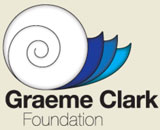About Us
The Graeme Clark Foundation is an Australian philanthropic foundation established in 2008 by Professor Graeme Clark AC that raises funds to champion, foster and support initiatives and research that help people with sensory disorders – hearing, vision and touch – reach their true potential.
Professor Clark invented the bionic ear (Cochlear implant), along with his University of Melbourne and Bionic Ear Institute colleagues. The bionic ear improved the ability of deaf people to understand speech; and continues to transform thousands of lives of many deaf children and adults around the globe to help them achieve their full potential in the world of sound.
Professor Clark and his colleagues continue to push back the boundaries for the multi-channel cochlear implant and aim to achieve high fidelity sound using nanobiotechnology.
The pioneering research by Graeme Clark and team has led to a new discipline in medical research, Medical Bionics – technologies to restore body function.
“Bionic ear research has created a new field of Medical Bionics, which I hope will eventually lead to a bionic eye for blindness, a bionic spinal cord, and bionic nerve repair to help restore the senses of touch and movement.”
Professor Graeme Clark AC
This area of medical research is offering hope of bionic nerve and spinal repair, a bionic eye, bionic epilepsy control, bionic drug delivery, bionic tissue repair, bionic muscles, organs and implantable sensors, and other magnificent achievements which this field may deliver for the benefit of humanity.
The Graeme Clark Foundation champions and support initiatives and research for people with sensory disorder, by:
- fostering innovative research working to improve, restore and repair sensory disorders – hearing (deafness), vision (sight) and touch (neurological disorders; diseases of the brain, spine and the nerves that connect them)
- granting funds for research into middle ear diseases and hearing loss; particularly the ear infection otitis media that is a major problem that leads to early childhood hearing loss in young Indigenous Australians; and is present in 90% of children
- supporting research to achieve high fidelity hearing, acute hearing in noise and musical appreciation with a cochlear implant and/or hearing aid.
- encouraging younger generations of Australians to consider careers in science, with the Graeme Clark Award for STEM Innovation in Schools; presented at the Graeme Clark Oration
- providing financial assistance to help children born deaf, who are financially and socially disadvantaged, to obtain a cochlear implant
“We have the knowledge to prevent a hearing loss, and the skills and technology to restore hearing to most people, we should provide better access to hearing healthcare around the world.”
Professor Graeme Clark AC

The Foundation includes a voluntary board, a research advisory and a fundraising advisory committee, which meet formally a few times throughout the year to progress the Foundation’s mission.
Visit the Projects page to find out more about the work the Foundation is championing for children and adults affected by life-limiting sensory disorders.
You can help people with deafness and other sensory disorders to develop their true potential, by making a tax deductable donation today to the Graeme Clark Foundation.
The Graeme Clark Foundation is registered with the Australian Charities and Not-for-profits Commission, and is endorsed by the ATO as a DGR 1 with TCC status. ABN: 67 130 361 876.
Appreciation
Appreciation from people using a cochlear implant:
“I can’t help feeling I’m experiencing a modern day miracle every day I talk to my mom on the phone.”
Anne Schmidt, Texas USA
“It has truly been a blessing in my life. I am most appreciative of your work and thank you from the bottom of my heart.”
Jack Day, Washington USA
“Thank you, thank you, thank you. I can’t say it enough. You have changed my son’s life forever.”
Jack Aregood, New Jersey USA
Read young Zuri’s story. Born profoundly deaf, she received the gift of hearing.
Read Alexandra’s journey. She had an illness at age seven that had left her profoundly deaf.
